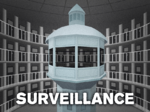Portal:Surveillance
Portal on Surveillance[modifier]
La Quadrature has developed, especially since the French Defense law of 2013 and the Snowden revelations on surveillance done by the NSA, analysis and proposals regarding surveillance from Nations towards citizens.
- Interception of communications, the core of the recent laws on intelligence and surveillance, must be applied under the authorisation of a judge and be controlled beforehand, during and after their application;
- Citizens must have a right to redress against interceptions, according to the right to a fair trial. In the case of classified documents, the jurisdiction should obtain the declassification of the documents when it is considered that secrecy is no longer justified;
- Metadata and connection data must be subject to the same level of control as content interception;
- Disposition of mass surveillance of connection data must be forbidden in a democracy;
- The universality of rights must be recognized and protected, and thus international surveillance measures must be subject to the same guarantees than national surveillance;
- Cooperation agreements with other intelligence agencies must be controlled by an independent organisation;
- Right to cryptography and anonymity online must be recognized;
- The development of secure tools and their use by citizens must be encouraged and helped, the communication on privacy and the impacts of online surveillance must be a priority.
Read all the proposals of La Quadrature du Net (fr) on surveillance.
French State of Emergency[modifier]
La Quadrature du Net has analysed the bill tabled at the French National Assembly:
Press releases by La Quadrature du Net.
|
French Surveillance Law[modifier]The "Bill on Surveillance" (#PJLRenseignement) raises many problems on the respect of fundamental rights, as well as gives legal protection to illegal practices and validates mass surveillance. The Bill was tabled on 19 March 2015, before the Council of Ministers; it was then examined by the Law Commission on 1 April 2015; and then voted at the National Assembly by formal voting on 5 May 2015, before the voting at the Senate on 9 June 2015. After being adopted by a joint committee on June 16, the law was finally adopted by both assemblies on 24 June 2015. The rapporteur at the National Assembly is Jean-Jacques Urvoas and the rapporteur at the Senate is Philippe Bas. This draft bill was examined under an urgency procedure. Three referrals have been tabled: one by 106 MPs, the second by the President of the Senate, and the third by the President of the Republic. The Constitutional Council delivered its decision on 23 July, 2015. The bill was passed on 24 July, 2015. It was then published on the Official Journal on 26 July 2015. French International Surveillance Law[modifier]
The draft bill on International Surveillance was announced at the Council of Ministers on 2 September 2015. This bill was tabled after the Constitutional Council adopts a motion of censure against the part on international surveillance in the Bill on Surveillance (PJL Renseignement). Then, this new draft was examined under an urgency procedure, and adopted on November 2015. Links:
|
Documentation[modifier]
Documentation on surveillance issues:
- Recensement des services autres que les services spécialisés de renseignement qui pourront avoir accès aux techniques de renseignement, conformément au décret n°2015-1639 du 11 décembre 2015
- Page référençant les actions en justice des Exégètes Amateurs
- Analyse globale des impacts des révélations d'Edward Snowden (en anglais)
- Recensement d'interventions dans la presse de personnes appelant à un « Patriot Act » à la Française suite aux attentats de Janvier 2015
